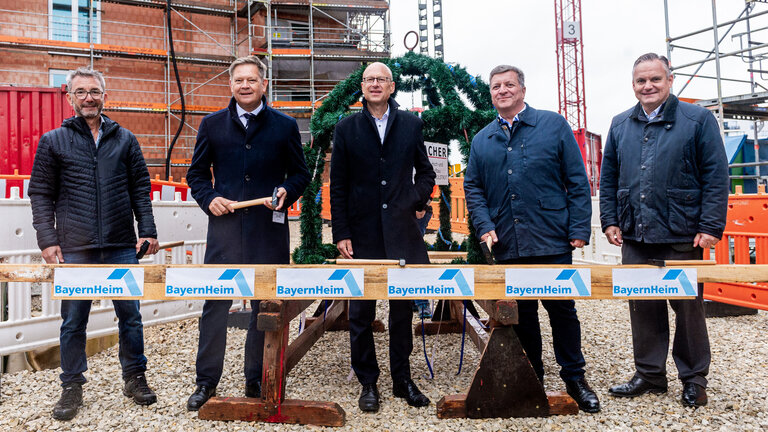Ingolstadt, Germany, October 2, 2024. Anyone looking for affordable living space in cities and urban areas faces a challenge. High prices for land and rising construction costs are causing prices to spiral ever further, making things especially difficult for people with middle to low incomes. However, this is set to change for 1,300 inhabitants of the German city of Ingolstadt, where BayernHeim GmbH, a company owned by the German Free State of Bavaria, is building a new urban quarter. The area currently being developed on Stinnestrasse in the city will include a childcare center, play areas, food and beverage outlets, and retail spaces in addition to 433 subsidized, fully accessible apartments for rent. Drees & Sommer SE specializes in construction and real estate consulting, and the company has been providing project management services to BayernHeim since October 2021. The topping-out ceremony on September 16, 2024, marked a major milestone for the building project.
Covering an area of 21,250 square meters – approximately the size of three soccer pitches – the new complex will comprise eleven buildings with one- to five-bedroom apartments. The development places emphasis as much on providing fully accessible housing and space for social interaction as on creating energy-efficient and climate-friendly solutions. BayernHeim is building all the apartments under the income-related housing subsidy scheme. This allows for rents to be based on household incomes, giving people with low incomes access to high-quality living space.
Meeting without Barriers
The plans include a childcare facility as well as spaces for the neighborhood management team, which will promote the interests of the inhabitants and safeguard the quality of life in the new urban quarter. Additionally, the development will provide meeting places in the form of green spaces and play areas, a central square, a coffee shop and a recreation center. All these places are designed to be wheelchair accessible. Older people and those with disabilities will not encounter any difficulties in using any areas – from the apartments and grounds to the basement storage areas and underground parking garages.
“We are creating an inclusive quarter that is accessible to all, and thus enables everyone to participate in community life but live independently,” explains Thomas Rzezacz, deputy head of the department responsible for new constructions and in charge of the project at BayernHeim. For Drees & Sommer’s project manager Florian Rieperdinger this approach is particularly important against the backdrop of demographic change: “In an ageing society, it is essential to create residential concepts that facilitate inclusion, equal opportunities and social engagement. Inclusive residential quarters promote communication between people and help to prevent social isolation. They are therefore an essential element of social sustainability.“
Energy-Efficient and Climate-Responsive Construction
In addition to social sustainability, BayernHeim focuses on ecological sustainability. The entire residential complex meets the German KfW 55 standard for highly energy-efficient buildings. The exterior walls are made of brickwork, which provides good insulation. Where this is not possible for structural reasons, reinforced concrete with a mineral-based thermal insulation composite system is used.
Another feature of the project are green roofs and façade greening. This not only saves energy, but also reduces carbon emissions. All this makes the neighborhood a model for the energy transition. “In Germany, buildings account for around 35 percent of total energy consumption by end users,“ says Florian Rieperdinger and explains: “heating, space cooling and water heating are the biggest energy guzzlers. Depending on the local infrastructure, district or local heating solutions, or the use of geothermal and heat pumps are possible.” Decarbonization is a core part of the transition to independence from fossil energy imports and for reaching climate targets.”
Monitoring Cost and Schedule
The future tenants are scheduled to move in in August 2026. Florian Rieperdinger and his team are responsible for ensuring the project runs smoothly: “As project managers we guarantee a seamless building process. We prepare schedules, coordinate the various trades and ensure that all stakeholders know their tasks and deadlines. Furthermore, we monitor the budget and make sure the project is financially on track.“
With the new urban quarter in Ingolstadt, BayernHeim GmbH is setting a good example for affordable living space in combination with sustainable neighborhood development. The next projects are already in progress: BayernHeim GmbH plans to create more affordable homes in the cities of Munich, Bayreuth, Fuerth, Dinkelsbuehl und Wuerzburg.
